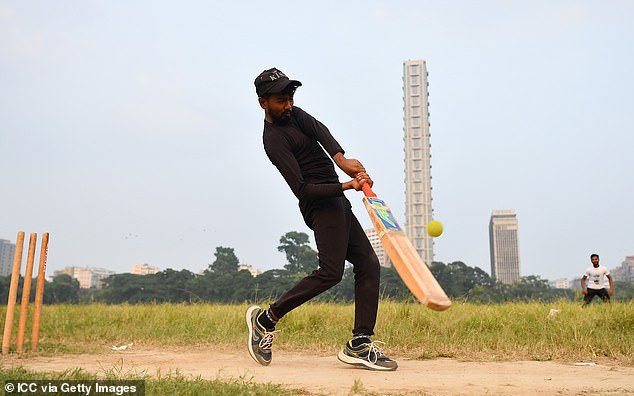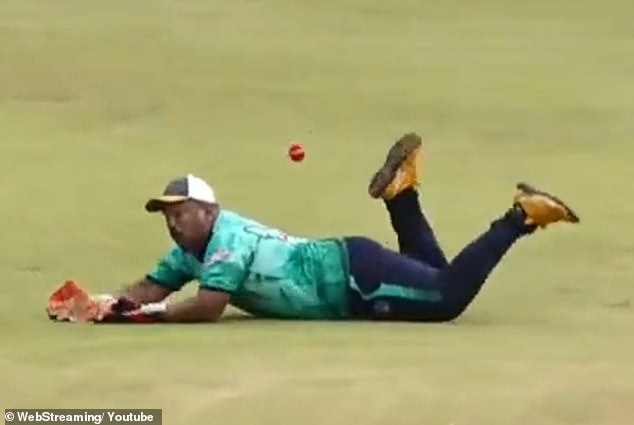A cricket player has taken an incredible catch in one of India’s domestic leagues by using his back to snare the ball – but fans are questioning whether he should have been credited with the amazing grab.
The incident played out in the Kerala Premier League, a televised competition where a tennis ball is used in place of a cricket ball.
KCSA Calicut was facing KPA 123 in round 11 of the league and KPA was well in control with four wickets down already for just 10 runs.
Suddenly, KCSA batsman K. Abhilash was left in disbelief as he edged the ball to the diving KPA wicketkeeper Mamu, who popped the ball up when he hit the ground, only for it to land on the middle of his back.
‘Unbelievable scenes the big man behind the stumps, Mamu, he holds the ball with his back, unbelievable catch or unbelievable save or unbelievable scene, what is that? Oh my!’ the shocked commentator said.
The wicketkeeper looked to have taken an impressive diving catch but the ball spilled loose when he hit the ground

He had to lay very still with the ball still on his back so a fielder could pluck it off and claim the dismissal
The scene has since gone viral, with cricket fans equally impressed and amused by the unique dismissal.
‘The use of a tennis ball, and the commentator suggesting there was “something on it” but he can’t be sure because he wasn’t watching, might just put this in the top three most village clips of all time,’ one viewer posted.
However some believe the wicketkeeper should not be awarded the catch under the Laws of cricket, if they even apply to the tennis ball version of the sport.
The catch should not be awarded to the keeper as he is not in control of the ball. Instead it should be awarded to the fielder who picked it up from the keeper’s back,’ a viewer suggested.
‘But is that HIS catch though? Or is it the guy who picks it off his back? Any umpires about? I need to know,’ asked another.

Tennis ball cricket has taken off in countries like India because expensive cricket balls, pads and helmets are not required, making it an accessible game

Tennis ball cricket faces unique challenges, like play being paused so a tractor can cross the field (pictured)
Tennis ball cricket, a game similar to traditional cricket, has a long history in India and other Asian countries such as Sri Lanka, Bangladesh, Pakistan, Nepal, Hong Kong, Thailand, and Kenya.
Its exact origin in India remains unclear, but the Tennis Ball Cricket Federation of India [TBCFI] was established in 1982 by Late N.U. Siddiqui to promote the sport.
It has since exploded and has been described as ‘the real spirit of India’.
Players don’t require pads, helmets or any other expensive gear and many young players even compete without shoes.
The game initially gained popularity in Mumbai, Gujarat, Uttar Pradesh, and Bihar due to its affordability and shorter duration.
Floodlit matches added excitement to the sport, which is now played by both men and women.
TBCFI gained recognition from the Indian government in 1999 and continues to organise national championships and tournaments for various age groups.

























